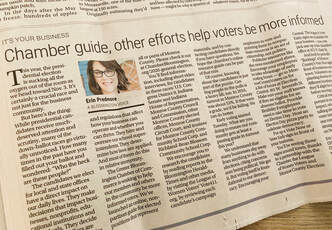 NOTE: This "It's Your Business" column by Chamber CEO Erin Predmore was published in the Oct. 9, 2020 Bloomington Herald-Times. This year, the presidential election is sucking all the oxygen out of the room as we head toward Nov. 3. It’s certainly a crucial race and not just for the business community. But here’s the thing: While presidential candidates receive much-deserved attention and scrutiny, many of the down-ballot races go virtually unnoticed. How many times in the past have you filled out your ballot and wondered: “Who the heck are these people?” The candidates we elect for local and state offices have a direct impact on our daily lives. They make decisions that impact businesses, nonprofits, educational institutions and individuals. They decide how our tax dollars are spent. They make policies and regulations that affect how your business can operate and whether you can thrive. They hire and oversee our school superintendents. They determine how laws are applied. And most of them do this in relative anonymity. The Greater Bloomington Chamber of Commerce is working to help our members and others in the community be more informed voters. We’ve launched an online, nonpartisan guide for elected positions that represent all or parts of Monroe County. Please check it out at ChamberBloomington.org/2020-general-election.
0 Comments
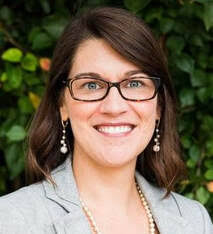 Erin Predmore Erin Predmore The Greater Bloomington Chamber of Commerce is urging the Bloomington Common Council to vote against Mayor John Hamilton’s proposal to increase the local income tax (LIT) by 0.25%. “A lack of public process makes this tax proposal impossible to support,” said Erin Predmore, the Chamber’s President & CEO. “Adding to the community’s tax burden is an important decision and should be guided by a clear community consensus. That work hasn’t happened.” In an online survey of Chamber members taken this week, 73% of respondents opposed the current proposal and an additional 18% opposed it at this time. Only 9% supported the proposal. The Chamber’s concerns about the proposed tax increase include: Lack of public engagement. The mayor proposed this tax increase in mid-July, but there was no subsequent attempt at public engagement until recently. The proposal was not mentioned during the August budget presentations, when it would have been an obvious and relevant point of discussion. Feedback from the community should be incorporated at the start of the process as a way to determine whether a tax is needed and how much is needed, not after a tax increase has been implemented. Lack of a compelling, sustainable plan. The current proposal is a grab bag of projects, including park trails, a composting program, a new transportation demand management job and more. The projects add to the city’s financial burden while lacking a coherent vision for how the LIT investments will be sustained. Before imposing a tax increase – especially one designed to spur economic development – the city needs to ensure a measurable return on investment and a long-term plan for supporting these investments. It is irresponsible to continue a cycle of taking property off the tax rolls, raising taxes and adding to the city’s financial commitments. Lack of collaboration. This proposal harms much-needed collaboration between the city and county, and with state legislators. The Monroe County Council has issued a statement urging the city to postpone this proposal, and we agree. Ignoring county officials risks damaging the important city-county relationship, which is already frayed. Further, city officials need to build stronger relationships with state legislators. Speculation about possible actions during the next legislative session is being used to justify pushing through this tax increase. The Chamber urges leaders of the City of Bloomington to strengthen intergovernmental relationships for the benefit of our community. There’s precedent for a different approach. In 2016, a LIT increase for public safety was passed with broad support for a focused purpose. The current proposal does not reflect that kind of community buy-in. “Businesses and individuals are stressed from the COVID-19 pandemic and face an uncertain future,” Predmore said. “Without a thoughtful, collaborative process and a sustainable plan, we can not support this tax increase and we urge Bloomington councilmembers to vote against it.”  Note: This "It's Your Business" column by Erin Predmore, the Chamber's President & CEO, first appeared in the Aug. 14 issue of the Bloomington Herald-Times. Earlier this summer, we unveiled an important historical marker for our community as a whole, for the business community and, most importantly, for the Black business community. In the 1960s, a business called The Black Market operated in the spot where Peoples Park is located now. Owned and run by Indiana University grad student Rollo Turner, it was a Bloomington store celebrating Black culture, with African art, clothing and music. It was a welcoming place for Black IU students and community members to gather. On Dec. 26, 1968, in a violent reaction to the civil rights movement, the Black Market was firebombed. What was one moment a thriving, locally owned business and center for Black culture became in the next moment a burning symbol of hatred and racism. The store was destroyed in the fire. As time passed, this location became a gathering place for local students, civil rights activists and other residents. The family that owned it later gave this land to the city of Bloomington to be maintained forever as a public park — Peoples Park. But as time passed, the story of this place — The Black Market, the firebombing, and its place in the history of the local civil rights movement — was left behind. People stopped telling others about it, and many residents never knew what happened here. I first learned about this history almost two years ago, when the Greater Bloomington Chamber of Commerce began working with leaders in the Black business community in an effort that led to the formation of the chamber’s Black-Owned Business Affinity Group. With their leadership, we partnered with the city of Bloomington to submit an application to the Indiana Historical Bureau. That work led to the installation of an historical marker at Peoples Park that we celebrated on July 31. But really, we were celebrating our community’s Black business owners and acknowledging that what happened here in 1968 still matters to Bloomington today. We forget that history at our peril. The treatment of people of color in Bloomington and Monroe County has been horrible, ranging from microaggressions at work to racial profiling to physical violence. Taking a stand against these behaviors is required by of all of us who want to be decent and humane. For those who don’t believe this is a moral issue or don’t acknowledge that racism still exists here, at least consider the economic impact of our community’s reputation. This summer, our office has fielded calls and emails from individuals and groups who were no longer willing to come to Bloomington because of the racist actions of some of our community members. In 2018, visitors spent over $418 million in Monroe County. What would we do if they all decided not to come back after the pandemic abates? Here’s another harsh reality, from the Monroe County Quality of Place & Workforce Retention Plan: “Minority residents do not feel the sense of welcoming community that Monroe County prides itself on. The legacy of the KKK in the region is remembered and felt today. Recruiters have trouble attracting diverse candidates to the region, to Monroe County, and to Bloomington.” Our community’s success is intricately tied to the success of our neighbors, friends and colleagues. We will all rise or fall together, and we can only rise by supporting those who need to be recognized as valuable members of our community. We must embrace the minority members of our community and stand for equality, equity and inclusion. To all people of color, the chamber is glad you are here. 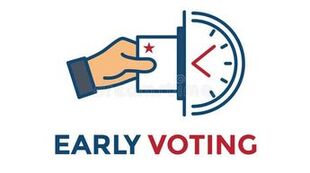 Early voting at Monroe County Election Central, 401 W. 7th Street. Early voting at Monroe County Election Central, 401 W. 7th Street. NOTE: The following op-ed was co-authored by Ann Birch, President of the League of Women Voters of Bloomington-Monroe County, and Mary Morgan, Director of Advocacy and Public Policy for the Greater Bloomington Chamber of Commerce. A version was published in the May 20, 2020 Indiana Daily Student. The COVID-19 crisis gives all of us a compelling reason to invest in our democracy—when could this be more important than in times of national emergency? Here’s what you can do to make sure your voice is heard: 1) Be aware. By now, all Monroe County registered voters should have received an absentee ballot application. If you want to vote by mail, no excuses needed, this is your chance. You can also apply for your ballot online at the Indiana Voter Portal. You have until May 21 to get your application in. You can still vote in person both on Election Day and during early voting. Early voting starts on May 26 at Monroe County Election Central, 401 W. 7th St. – check their website for hours. With the continued need for protection against COVID-19, your polling place on Election Day (June 2) may have changed, and new rules will be in place to minimize the chance for contagion. Find your polling place at the Indiana Voter Portal. 2) Be informed. Several nonpartisan guides give candidate information and enable comparison between candidates on issues. The Greater Bloomington Chamber of Commerce provides a voter guide for local candidates, state legislature candidates, and District 9 congressional candidates. The League of Women Voters voter Vote411 website includes questions and answers on issues for federal and state races and links to candidate information for local races. Just go to the site, enter your address, and under “Find What’s On Your Ballot,” click Explore Now. In addition to these two resources, the Concerned Scientists at Indiana University Bloomington organization has queried District 9 congressional candidates on science topics. Check out the CSIU website to read the responses. 3) Be counted. This is a census year. When you respond to the census, you are helping to direct billions of dollars in federal funds to local communities for schools, roads, and other public services. In addition, census results are used to determine your political representation at all levels of government. If you’re an IU student, have you counted yourself? Getting students to count themselves and their roommates at their off-campus apartments, not at their parents’ homes, has been challenging. Go to the Census 2020 site to fill out the questionnaire. It’s important. And it’s easy. 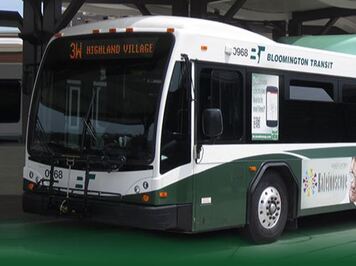 As our community works to strengthen public transit, the Greater Bloomington Chamber of Commerce urges the Bloomington City Council to take an initial step: Amend Chapter 2.76 of the Bloomington Municipal Code, enabling Bloomington Transit to provide service outside the city limits. According to Erin Predmore, President and CEO of the Chamber, “This is a small but necessary step to make our community’s public transit system even better for city residents, including employers and people who work in urbanized areas of Monroe County.” The current code states that the boundaries of the Bloomington Public Transportation Corporation, which operates Bloomington Transit, must be “coterminous” with the city’s boundaries. Lifting this restriction, by itself, does not mean that Bloomington Transit will immediately start operating buses outside the city limits. But it does provide flexibility for BT to adjust its routes in the future, if BT staff and board find it to be financially viable. BT is undergoing a route optimization process. Consultants for this project recommend that BT provide service out to Ivy Tech and Cook Group, located just beyond the city limits. However, this service would not be possible under the current city code. Nor can BT offer service to Ellettsville, under current constraints. “Most of us don’t constrain our lives to the city limits, even if we live within them. Many city residents need to attend Ivy Tech, or work at Cook Group and other businesses located slightly outside the city, or shop on the western edge of our community. We need a transit system that reflects the realities of our community and serves the needs of city residents,” says Predmore. Providing reliable public transportation helps all city residents. A recent report by the Bloomington Affordable Living Committee – “Working Hard, Falling Behind” – includes this feedback from Amethyst House, a local nonprofit: “Affordable, reliable and accessible public transportation is critical to many in our community as they work to sustain employment, fulfill basic needs, gain access to social services, and engage in our community.” The Chamber recognizes there are many challenges to expanding transit, including financial resources and political issues between the city and county. Looking at how to improve public transit in other ways should also be a goal for our community. There’s hard work to be done. But changing this city ordinance is an easy step, and we urge council to take it.  As we look to 2020, the Greater Bloomington Chamber of Commerce is seeking input on issues that take priority for our members, local businesses and others throughout our community. Results from this 2019 Public Policy and Legislative Survey will help guide our legislative priorities and shape our advocacy in the coming year. Please click the button below to weigh in – and thanks for your feedback!  Erin Predmore, President and CEO of the Greater Bloomington Chamber of Commerce, issued the following response to recent comments by Jerry Falwell Jr.: We have been horrified as the tragedy at the border seems to get worse every day. The recent publication of the images of the migrant father and toddler brought the reality closer to all of us. As the voice of business in our community, The Greater Bloomington Chamber of Commerce rejects Jerry Falwell Jr.'s characterization that business/entrepreneur experience somehow validates disgusting treatment of our fellow humans. Our members care deeply about our community, lead with compassion and honor, and attempt daily to add shared value to our economy. "Making payroll" or building an organization "from scratch" are experiences that have changed us, but they haven't caused us to reject the humanity of those in need. They also don't somehow make our opinions about the border crisis more valid than other caring individuals. We stand with our fellow humans, Dr. Falwell, and we still make payroll, build things from scratch, innovate, shape our community, and make room for all. In fact, we currently have hundreds of available jobs and would be happy to have some new neighbors. |
Categories
Categories
All
Archives
Archives
May 2024
|
|
Copyright The Greater Bloomington Chamber of Commerce. All Rights Reserved.

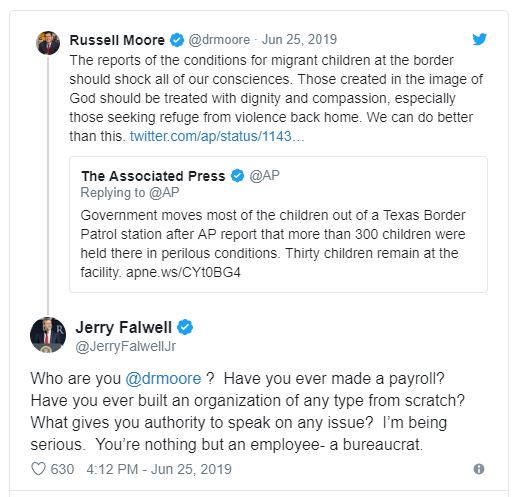
 RSS Feed
RSS Feed
